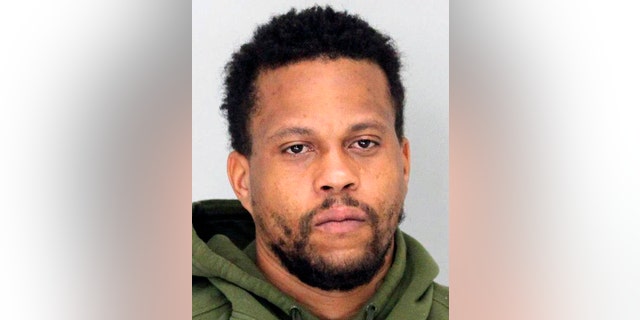A Texas murder suspect charged in a deadly 2019 shooting at a Dallas hotel was released back onto the streets Monday without having to pay bond after a massive data deletion at the police department left prosecutors clamoring to review whether any evidence tying him to the slaying was lost.
Jonathan “P-Money” Pitts, accused of fatally shooting Shun “Big Youngster” Handy during an argument on Jan. 28, 2019, was seen wearing a mask and an ankle monitor on Monday while walking out of the Frank Crowley Courts Building in Dallas.
District Judge Ernie White was forced to release him on a personal recognizance bond, the Dallas Morning News reported. Under state law, pretrial detention is prohibited when prosecutors aren’t ready to begin trial on the scheduled date, Pitts’ defense attorney, George Ashford III, said.
CHICAGO DAD WANTS STRICTER BAIL FOR ACCUSED CHILD RAPISTS AFTER 15-YEAR-OLD DAUGHTER TURNS UP DEAD IN AN ALLEY

This image provided by the Dallas Police Department shows Jonathan Pitts. Pitts, a Texas man who was scheduled for trial on murder charges this week, has instead been granted release on bond. (Dallas Police Department via AP)
(Dallas Police Department via AP)
His trial was supposed to begin last Thursday, but prosecutors are seeking more time as a city audit is conducted into the loss of eight terabytes of data, which the Dallas Police Department said was permanently deleted months ago when a city IT employee was migrating police evidence from a cloud system to another server.
Dallas City Manager T.C. Broadnax said the data loss included photos, videos, audio, case notes and other files related to a yet-to-be determined number of cases.
Just one terabyte alone is capable of storing 250,000 photos and 6 million documents, Fox 4 reported.
The deletion happened between March 31 and April 5, but the Dallas Police Department did not make District Attorney John Creuzot’s office aware of the loss of data until about two weeks ago when prosecutors from different cases began inquiring about missing evidence.
CLICK HERE TO GET THE FOX NEWS APP
Dallas police do not believe any evidence was lost in connection to Pitts’ case, but a detective told the judge the morning the trial was set to begin that he could not be sure until the city audit was completed. It’s unclear at this whether the data loss will prevent prosecution from moving forward.